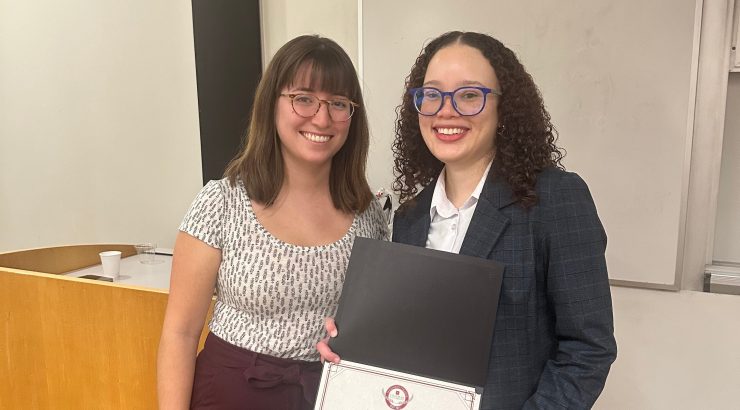
From Our Eyes: My Research Journey in Analyzing Emotions in Cli-Fi
May 17, 2025
This edition of Wilkinson College’s Arts, Humanities, and Social Sciences From Our Eyes features Emily McEachin (‘25 English and Environmental Studies minor), one of the 11 student fellows who participated in the inaugural Wilkinson Interterm Research Experience (WIRE) during Interterm 2025. This immersive program provided students with the skills and experiences necessary to excel in academic research. McEachin’s research project focused on “Analyzing and Applying Shared Elements of Climate Fiction.”
When I applied to WIRE (Wilkinson Interterm Research Experience), I was unsure of what to expect. I just knew I wanted to conduct original research on a topic that united my interests in English and Environmental Studies. Little did I know that being a WIRE fellow would become one of my most rewarding experiences at Chapman University, and just in time for my graduation.
Over the January Interterm, I had the rare luxury of devoting 30 hours a week entirely to my research project, “Analyzing and Applying Shared Elements of Climate

(left to right) Emily McEachin (‘25 English and Environmental Studies minor) and Dr. Richelle Tanner (Environmental Science) at a WIRE workshop during January Interterm.
Fiction.” This was an opportunity my faculty mentor, Dr. Richelle Tanner (Environmental Science), pointed out that I’d likely never have again. My research focused on climate fiction or “cli-fi”, a genre that explores the effects of climate change on people and the planet. I read 30 short stories and trawled through several dictionaries to create a word bank of emotional indicators and synonyms found in them. The goal was to identify the most common emotions used in these narratives. Using that data, I would then write a short story of my own.
It wasn’t always smooth sailing, and there were several times I had to pivot in my research and writing process. The first challenge came when I was unable to use AI to help tally the emotions in each story, as I had initially planned. That meant having to turn to R-studio—far from my favorite tool as an Environmental Studies minor—but thanks to Dr. Tanner’s expertise, it wasn’t too bad. A second unexpected challenge arose from the results themselves, which revealed that happiness was the most dominant emotion used. This surprised me, considering the traditional approach to the subject matter. It also meant shifting gears creatively. I now had to undertake the task of writing a positive, uplifting climate fiction piece that wasn’t filled with the usual desolation and despair of a dystopian world, which was a challenge in and of itself. Finding a balance between optimism and realism was one of the hardest parts of the process, and I found myself asking Dr. Tanner many questions about the scientific elements behind my story.
Seeing my project through from start to finish and watching my peers’ work unfold as we presented at the Wilkinson College Staff and Faculty Retreat was also incredibly rewarding. Each of us had an idea that we cared about, and WIRE gave us the time and support to pursue it.
I‘m deeply grateful to Wilkinson College and my faculty mentor, who made this possible, and I would encourage Wilkinson students with their own ideas and nagging research questions to apply to future iterations of WIRE.
(Pictured in header: (left to right) Dr. Richelle Tanner (Environmental Science) and Emily McEachin (‘25 English and Environmental Studies minor) receiving a certificate for her research at the Wilkinson College faculty and staff retreat WIRE presentations in January 2025.)

